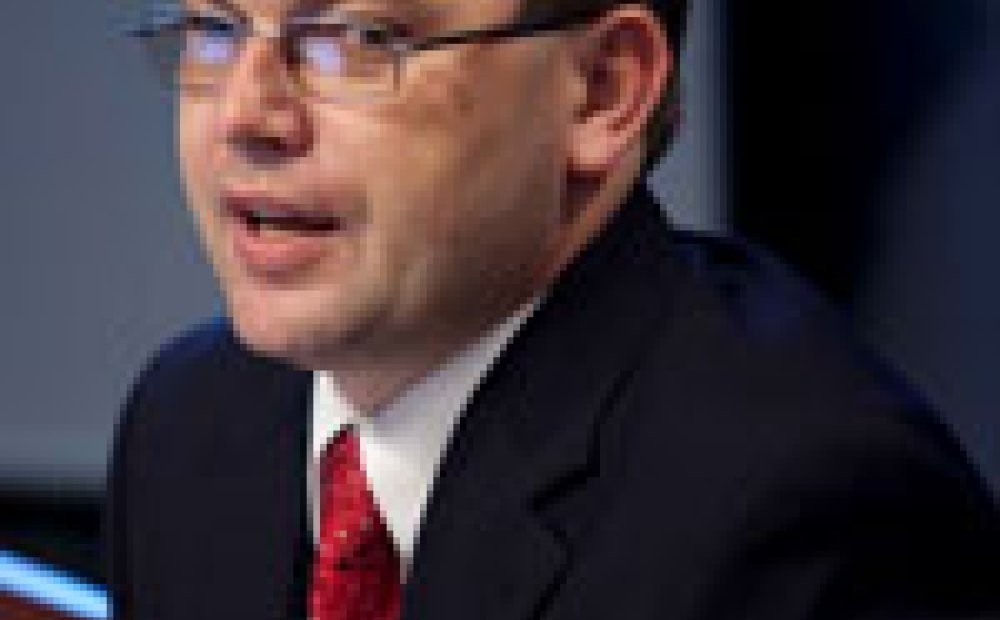100 Days at the Office: President Yanukovych's Economic Policy

Yanukovych came to office with the goal of bringing stability and economic growth to Ukraine, but his new coalition government does not have the recipe to make this dream come true, said Nazar Kholod, independent scholar, Washington, D.C. and former Fulbright-Kennan Institute Research Scholar. Upon assuming office, the president formed a Committee for Economic Reform to plan how best to achieve these goals. At a 14 June 2010 Kennan Institute lecture, Kholod discussed the various recommendations of the committee and Russia's large role in Ukraine's economic future.
Restoring the strained relations between Ukraine and Russia after the Orange Revolution was a top priority for the new Yanukovych administration, a coalition government comprised of the Party of Regions, the Communist Party, and the Lytvyn Bloc. On 21 April 2010, Russia and Ukraine signed what is often referred to as the "gas for fleet" treaty – "the first and the most important agreement" between these two countries, according to Kholod.
The treaty gave Ukraine a 30 percent discount, but the discount cannot be more than $100 per 1,000 cubic meters. In return, Yanukovych agreed to extend a twenty-five year lease to Moscow for its Black Sea fleet in Sevastopol. While Russia had a long wish list, Kholod stated that Yanukovych would not grant it all its requests. In fact, Yanukovych asserted that Ukraine would not join the customs union which Russia wants to form with Belarus and Kazakhstan, does not and will not recognize the republics of Abkhazia and South Ossetia, and most importantly, is not interested in the Naftogaz merger with Russia's Gazprom. "The first 100 days show that Yanukovych is very interested in Russian economic relations but he is not a Russian stooge," said Kholod.
This attitude is supported by Ukrainian oligarchs who are angry about Medvedev's sharp refusal to grant them direct access to Central Asia gas. However, Ukraine's substantial budget deficit, as well as the unlikelihood of receiving IMF loans, means that Russia may soon be the country's primary lender and will have strong influence on Ukrainian development.
Kholod pointed out several strong points of Yanukovych's economic reform program, including improvement of business and investment climate, tax code reform, public health reform, and integration with the EU. For now, these initiatives exist only on paper, and Kholod doubts they will be implemented any time soon. Some key reforms - administrative reform, judicial reform, realistic and practical anti-corruption program, constitutional reform – are missing from Yanukovych's program and it makes the program less expedient. "The government is not actually committed to these reforms," he concluded.
By Larissa Eltsefon
Blair Ruble, Director, Kennan Institute
Speaker
Associate Professor, Department of Economic Theory, Ivan Franko National University, Lviv
Hosted By

Kennan Institute
After more than 50 years as a vital part of the Wilson Center legacy, the Kennan Institute has become an independent think tank. You can find the current website for the Kennan Institute at kennaninstitute.org. Please look for future announcements about partnership activities between the Wilson Center and the Kennan Institute at Wilson Center Press Room. The Kennan Institute is the premier US center for advanced research on Eurasia and the oldest and largest regional program at the Woodrow Wilson International Center for Scholars. The Kennan Institute is committed to improving American understanding of Russia, Ukraine, Central Asia, the South Caucasus, and the surrounding region through research and exchange. Read more
